- Home
- Jonathan Stroud
Buried Fire Page 8
Buried Fire Read online
Page 8
"Not much we can do, is there? I need to sleep."
"We can't have them seeing you like this. That'll confirm all their prejudices. Depends where they are. Hold on, I'll see."
He left Stephen among the trees and moved off, keeping to the edges of the drive, where the gravel was sparse and overgrown with weeds. A minute later he was back, breathing heavily.
"They're in the sitting room. The Pope's yakking and Sarah looks angry. There's a storm brewing."
"Good. Maybe we can slip past."
"If we go round the back, we can have you in bed before the dust settles."
Michael led the way around the edge of the drive to the side gate. It opened with a squeal which made him cringe, and they passed though into the garden. The path ran down the side of the house, under the gaze of a small open window which belonged to the sitting room. From it came Sarah's voice raised in anger.
"We'll have to duck down low by the window," Michael whispered. "You go first and I'll say when."
Stephen inched his way along, feeling the pebbledash against his fingers on the right. As he drew close to the window, Sarah's words became distinguishable.
"Why don't you tell her about it, since you know each other so well! I've got more important things to do than waste my time listening to all this rubbish."
"Now look—" Tom's voice was heavy with annoyance.
"You've plenty of excuses to work late now. See if I care."
"This is ridiculous. What's put this into your head?"
"What are you waiting for?" Michael prodded Stephen in the small of the back. "She'd be better off without him, and you know it. Come on, let's go."
Stephen bent down, almost double, and scuttered sightlessly under the window. Michael followed him, and together they moved away towards the corner of the house. Behind them, their sister's angry voice continued to sound out into the dusk.
16
On his way back, Tom took a detour. He had wound down the window and his face was buffetted by the air of late evening, warm, scented and mazy with insects. His body seemed compressed with tension and anger; a jagged spring coiled in his chest, its end stabbing at his lungs and sending a sharp tightness out into his shoulders and arms. His foot hit the accelerator savagely; each curve of the drowsy lanes was a challenge to be snapped at. In such a mood, he could not go home. Not yet.
The road made a wide arc through the darkening fields, and flirted with the southernmost fringes of the Russet. For nearly all its length, the trees were banked on one side of the road only, their impassive columns buttressed against the strips of arable land. At one point however, the trees extended beyond the road to form a separate, isolated square of forest. This was Crow Wood.
Tom stopped the car. When he got out, he took two long breaths, leaning back against the warm metal. The sky was blending with the black leaves overhead.
He should have been more patient, shouldn't have got angry. Sarah was still upset about her brother, and rightly so. He should have spent less time talking about his own problems, and listened like a priest should. But to bring up Elizabeth Price, when he hardly knew the woman . . . Crazy! Where on earth had that come from?
He sighed heavily. Nothing seemed to be making sense any more. In the space of a day, everything had shifted. Nothing was right. Why break into a church? Why dig up an old stone? Why get worked up over an old cross?
Why spend hours in a library, when you didn't know what you were looking for?
No, but there was something to be found. Tom was sure of it. And he had one lead still to follow.
He must get some sleep. But first, to get rid of the tension, he set off at a run, following a beaten path into the trees.
Tom forced himself to run at speed. The tension in his chest pained him, but he ignored it, letting his arms and legs work to their full, and soon the ground was flashing past at a disembodied pace. His eyes were locked ahead, his body straining, and the residue of frustration and weariness was lost in the air behind him.
When, in a state of emptiness, he slowed, heart racing, breath jerking with life, he found he had come to the ruin in Crow Wood. There was a small clearing among beech trees, its floor pierced in many places with saplings and forest fronds and now thick with dusk. A wall of bricks, slightly taller than head height and punctured by the thin skeleton of a window, rose from the bracken on one side of the clearing. Another wall, at ninety degrees to the first, attained a lesser height and stretched into the darkness. The ground was ridged and tussocked with the chaos of fallen masonry.
Tom's shoes crunched on brick fragments. He walked into the centre of the dead house. The inner surface of the wall was jet black. White moths flew around his head, spreading silence with their wings. A lone timber, charred along one length, was propped against the wall. A beer can had been lodged carefully on top of it. Moving closer, he made out faint signs drawn on the bricks. He struggled to read them, his eyes screwed up . . .
The words had been scraped on the charcoal lining of the bricks, and showed through red against it: Sandra 4 Lewis. 1979.
Tom turned away. Alfred Willis had died here, a hundred years ago. He tried to imagine the smell of burning, the heat, the trees orange and red with flames, the sounds. But a hundred years of green silence covered those images and smothered them.
Tomorrow he would check the County Records. Somebody must have a copy of Willis's book. He would find it, read it, and then he would stop chasing shadows.
He walked back to the car and drove home slowly.
17
It took two minutes for Stephen to be spirited up to his room and put to bed. He was asleep almost immediately, his eyes closing properly for the first time since he had left the Pit. Michael went downstairs and made himself a sandwich in the kitchen. His eyes were burning fiercely. It had grown worse throughout the afternoon, and now they felt red around the rims.
Michael sluiced cold water on his face and blinked several times to make his eyes settle. Slowly, the heat faded, but a bottled-up desire remained. The urge to see – the other way – was very great. All day he had felt the pressure to use his new sight, and though he had mostly been able to keep this feeling under control, he would not be able to do so for long. Besides, he had only had Stephen to look at all day. Tomorrow, he would go into the village, and watch the people on the green. The anticipation of their jewel-like hidden souls made his heart ache.
Sarah came downstairs from her bedroom. She started when she saw Michael standing by the sink.
"So you're back, are you?" she said, tartly. "Where have you been all day?"
Michael made ready to unlock his excuses.
"I felt an awful lot better this morning. Stephen and I went for a long walk – I needed some air."
"Where did you go?"
For no real reason, a lie slipped out: "The Russet. To Thrush Bank and back."
"And where's Stephen?"
"Asleep. He's absolutely shattered. No stamina, that's his trouble."
"You should have left a note. You're both just bloody thoughtless."
"Sorry, Sarey. Sorry I've upset you."
He waited, hardly daring to believe it would be that simple, but Sarah left it like that. She went to put on the kettle. Michael fidgeted a little.
"Sarah, I couldn't help hearing just now . . . I'm sorry you had a row. Are you OK?"
She sighed, flicked the switch and sat down at the table opposite him.
"Oh sure. It was my fault really. I was worried about you, and Tom's got a lot on his mind at the moment. We'll be fine tomorrow. It's just been a really crap day."
She gazed at the tabletop for a time. Michael found he had an overwhelming temptation to look at her with his other sight. From somewhere else came a doubt, a sense that to do so was an invasion of her private space. But he did it anyway.
Her soul was swirling slowly with a dozen shades of blue, shining and glistening with a beauty which lanced him through with guilt and shame.
&nbs
p; "I'll make you a cup of tea," he said.
"Thank you, Mikey."
She drank it rapidly and strong. When she had finished, she looked up at him with an appraising eye.
"Michael," she said. "Could you do me a favour?"
"Sure."
"I was meant to go over to Mr Cleever's this evening, and pick up a series of council leaflets. I'm distributing them next week. I really don't want to go – you know how overpowering he can be. Do you think—?"
"Say no more. You'll have to tell me where he lives."
"Have you got lights for your bike?"
"Quit worrying, sis. I won't come to any harm."
Sarah watched him set off, pleased at his willingness to help. In truth, he did seem a lot better today, and hopefully Mr Cleever would be able to build on that with a few subtle words of advice. She tapped her empty mug with exasperation. Really, Tom should have been the one to do it, but the whole cross business was getting him too wound up. He needed to calm down and rest.
For that matter, so did she. Things would be better tomorrow.
Filled with his contrition, Michael was soon gliding down the hill like a ghost in the night, the beam from his front light casting the hedges into strange relief. A startled rabbit ran in front of his wheel and nearly sent him tumbling, but he stabilized himself and soon shot out into the deserted green, which was lit in places by orange light from the village windows.
Mr Cleever's house was a sizeable Victorian villa set back from the green behind a rose garden. His sizeable car was parked on the verge outside, and it was next to this that Michael left his bike. He walked into the garden under a kissing gate of climbing briars, and headed up the path. Ahead, thick curtains hugged against the glass of great bay windows, from behind which came forth music and light and the sound of voices. The sultry scent of ageing roses hung about him as he passed along the paving stones to the door and rang the bell.
There was a break in the flow of voices from beyond the window, then someone laughed, and the noise began again. Michael fidgeted on the doorstep, anxious to be gone. A sound of movement came from inside, and the door opened. Mr Cleever looked out, squinting a little as he adjusted to the dark, and broke into a wide smile of welcome.
"Michael MacIntyre, isn't it? An unexpected pleasure."
"Hello, Mr Cleever. Sarah sent me over . . . to collect some pamphlets . . ."
He trailed off, conscious of the intensity of Mr Cleever's gaze, feeling somehow a little foolish as he stood there on the step, still grass-stained from events on the Wirrim. I should have tidied myself up a bit, he thought.
"Pamphlets . . ." Mr Cleever seemed to have difficulty focusing on the issue himself. "Of course! She can't make it, then?"
"No, she's a bit under the weather."
"I'm sorry to hear it. Well, it's good of you to pop down yourself, Michael. Come in a moment."
"I don't want to bother you if you've got guests." Michael hesitantly moved into the house; Mr Cleever held the door ajar, and closed it as soon as Michael stepped through.
"Good heavens, no bother about it," said Mr Cleever. "Just some old friends. They can wait a minute. Straight down through the house, Michael, to the sitting room. I'll hunt out the pamphlets in a moment."
Michael walked down the narrow hall, with Mr Cleever close behind. The walls were white and adorned with prints of old engravings. They reflected their owner's archaeological interests – Michael caught flashes of standing stones, henges, forts and ruins. The floor was of black and white tiles; aspidistras in large vases took up position in tight corners; and the light was surprisingly poor. Somehow, it all gave off an old-fashioned aura which made Michael feel hemmed-in by history.
They passed a door which must have led into the front room. It had been pulled almost to, but the bright light gleamed round the cracks. A stream of classical music came from inside, yet it seemed to Michael that the volume had been turned low, and that the voices were stilled too.
There was a small sitting room at the end of the hall. Mr Cleever squeezed past Michael and waved him to a chair.
"The pamphlets are upstairs somewhere. I'll fetch them. Would you like a beer while you're waiting?"
Michael was slightly taken aback. It was not something adults asked. The only beers he had tasted were surreptitious ones, bought for him at off-licences by Stephen and some older friends. Still, Mr Cleever was a bachelor; maybe he didn't quite know the score.
He took advantage. "Yes please."
"Excellent." It was only while Mr Cleever was unearthing a bottle from somewhere in the neighbouring kitchen that Michael remembered that his host was sometime youth group leader of Fordrace, and had been known to campaign on the subject of underage drinking. "You old hypocrite," he thought, as he accepted the bottle.
"Won't be a moment," smiled Mr Cleever, and disappeared back into the hall. His footsteps could be heard ascending the stairs.
Michael sat back in his chair and sipped the beer. The sharp smooth earthy tang settled round his tongue and added to his general feeling of unreality. He looked about him, taking little in, waiting for Mr Cleever to return. Above, there was the scuffled sound of movement, but his host did not reappear on the stairs.
An engraving above the fireplace caught his eye. It was the only picture on the wall, caught in an age-darkened gilt frame. It was of the kind he had seen in books, a three-dimensional plan of an historical site, only with odd perspective, and with little figures wearing the costume of another century. There were curly letters – A, B, C, D – next to important bits, and notes to these letters written in ornate handwriting at the bottom of the engraving, but they were too far away for Michael to read.
The site depicted was a burial mound, covered with grass and with its rim set about with stones. Half of it seemed to have fallen in on itself. Men in tall hats were standing on it, holding odd measuring devices. There was a smaller barrow in the background, and something dark flying in the sky. Michael had half a mind to get up and survey the picture at close hand, but indolence and the pleasant numbness of the beer prevented him.
On the mantlepiece below the engraving – Where on earth was Mr Cleever? – was a small object which caught the corner of his eye, like a sudden movement. Between a porcelain milkmaid and a drummer boy, both of which Michael considered quite naff, was a ceramic lizard.
It was maybe six inches long, coiled in upon itself, with a long green body and an endless tail, which wrapped the base of the model twice round. The head was raised slightly; the small red eyes, set back low upon the thin elongated snout, were half open, and gazed up as if considering the room with a cold appraising eye. The mouth was closed, but somehow managed to suggest a lot of teeth under its surface. It was distinctly ridged.
Michael looked at it for a moment, and then, for the first time in an hour or more, he became aware of an aching in his eyes.
There was no doubt that the model was very well made. It might even be valuable. The two eyes, which gleamed so, could well be made of garnet or some other semi-precious stone. Maybe – Michael thought – even ruby! Some of the larger scales on the back of the body were also gems.
All in all there was a definite beauty to it, and Michael began to wonder how it might look to him through his other sight. In its loveliness, it reminded him of the souls he had seen, only harder, more solid. He felt he might risk a look, just quickly.
From down the hall, and the distant room filled with unknown company, came a sudden laugh; a woman's, high and gleeful. Michael jumped and his whereabouts returned to him in a flurry. All at once he realised how quiet it had been before, and how close the room had got. There was a little sweat on his forehead.
He looked at the mantlepiece again. The model lizard seemed to have lost its sparkle. The eyes were dull once more.
Where was Cleever? He'd practically finished the beer. All of a sudden Michael was annoyed. Had he got the pamphlets or hadn't he? Had he forgotten him, or was he playing some kind of g
ame?
Well, you couldn't do that to Michael any more, parish councillor, youth leader, archaeology chairman or not. If you kept him waiting, you paid the penalty, and the penalty was—
—Michael would take a peep at Mr Cleever's soul. See that private side, he would, and he would never know that he had had it done. Yes. A pompous old fool, Cleever, and a little slimy. What would it be? A wart-hog, or a dung-beetle? Michael grinned to himself, and all of a sudden, he heard returning footsteps on the stairs.
Now then.
Mr Cleever came back into the room. There were no pamphlets in his hand. Michael waited. Not yet.
"I have to apologise, Michael," Mr Cleever said (but he was still smiling). "The pamphlets your sister wanted aren't here yet. The ones upstairs are for a different area of the parish. Sometimes I don't know if I'm coming or going, what with all my different interests."
Pull the other one. What do you take me for? What are you after? You don't play with me.
"Oh," said Michael. "I see. Well, it was nice beer."
"You must send your sister my apologies. It must have been tedious for you. Did you notice that engraving, by the way? An original, you know. 17th century. Do you know where it's of?"
Who cares? Don't try anything with me. You turn out the light, I see in the dark.
"No? It's up on the Wirrim. The Pit, Michael. Do you know where that is? Up on High Raise. I hear you go up that way sometimes."
So I do, stranger. And I do more than that. Things happen to me; things happen which make me different.
"Nowadays, the surface of the mound has entirely collapsed. There's some structural instability in the ground below, which has led to quite a sizeable hollow being formed. Very unusual feature. But then, the Wirrim's an unusual place."
He looked back at Michael, and rested his arm on the mantlepiece. Michael was motionless in the chair.
I should do it now. Look him right in the eyes. And do it.
Mr Cleever smiled suddenly. "You're different, Michael, but you're not unique. Go ahead, take a look. I won't mind."

 The Leap
The Leap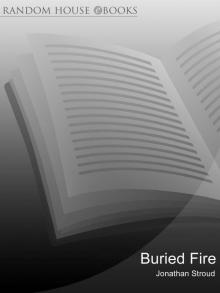 Buried Fire
Buried Fire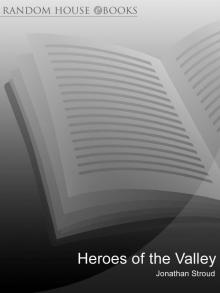 Heroes of the Valley
Heroes of the Valley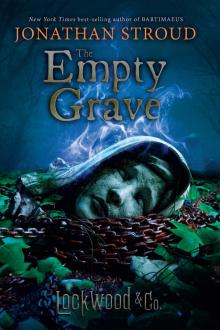 The Empty Grave
The Empty Grave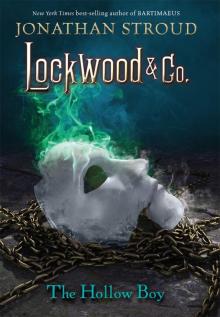 The Hollow Boy
The Hollow Boy The Last Siege
The Last Siege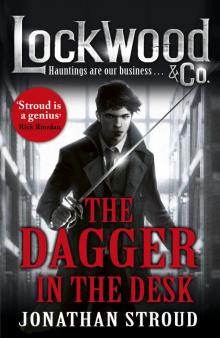 The Dagger in the Desk
The Dagger in the Desk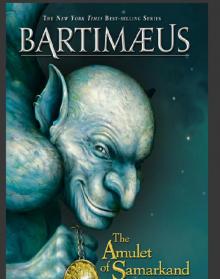 The Amulet of Samarkand
The Amulet of Samarkand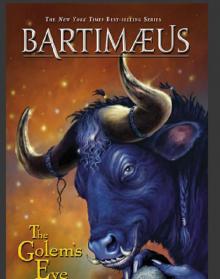 The Golem's Eye
The Golem's Eye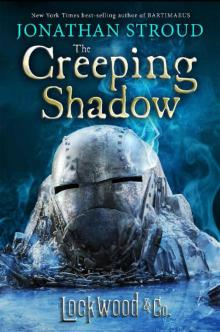 The Screaming Staircase
The Screaming Staircase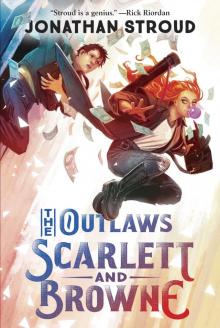 The Outlaws Scarlett and Browne
The Outlaws Scarlett and Browne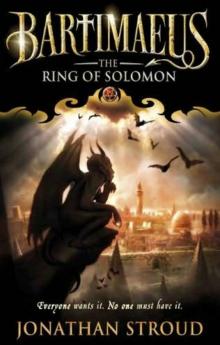 The Ring of Solomon: A Bartimaeus Novel
The Ring of Solomon: A Bartimaeus Novel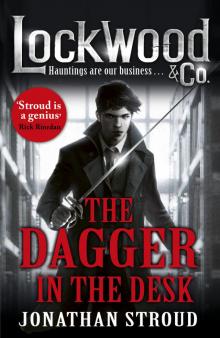 Lockwood & Co
Lockwood & Co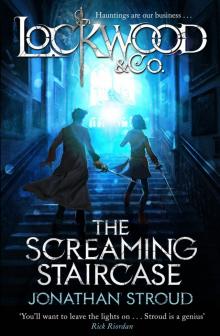 Lockwood & Co: The Screaming Staircase
Lockwood & Co: The Screaming Staircase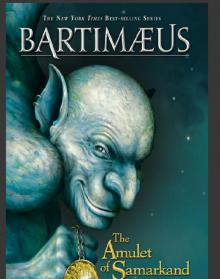 Bartimaeus: The Amulet of Samarkand
Bartimaeus: The Amulet of Samarkand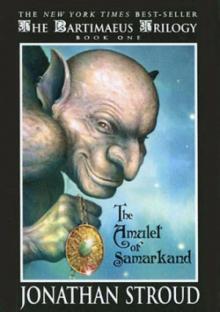 The Amulet of Samarkand tbt-1
The Amulet of Samarkand tbt-1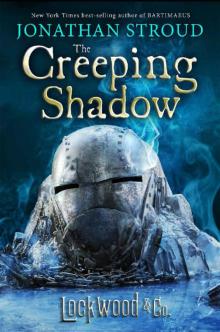 Lockwood & Co.: The Creeping Shadow
Lockwood & Co.: The Creeping Shadow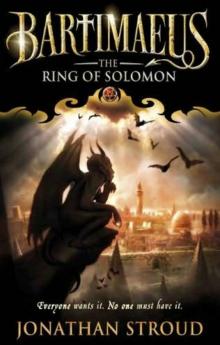 The Ring of Solomon
The Ring of Solomon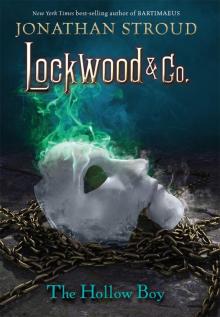 Lockwood & Co. Book Three: The Hollow Boy
Lockwood & Co. Book Three: The Hollow Boy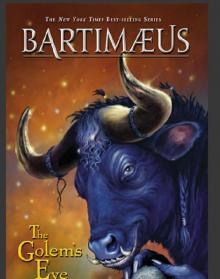 Bartimaeus: The Golem’s Eye
Bartimaeus: The Golem’s Eye